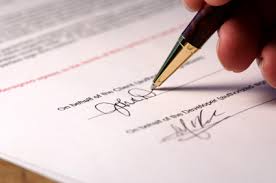The Notary is one of the most powerful and respected figures in Spanish life. Whatever your nationality, you must involve the Notary in any major transaction such as buying a property or making a will. In England, when we make a will or buy or sell a property, everything is dealt with by the solicitor. In Spain, the solicitor does the leg work, but unless the Notary is happy, you cannot complete on your sale or authenticate your will. And the Notary, not the solicitor, will register your title to your property with the Land Registry.
When you see the Notary, make sure you are smartly dressed. If you are wearing shorts and a vest top, he will not see you. The Notary is very powerful and everyone is expected to show respect for his office by dressing appropriately. So it’s trousers and shirt for the men, although a tie is optional, and trousers, skirt – not too short - or dress for the ladies. There seem to be dozens of staff in the Notary’s office, but you can easily identify The Man Himself. He’s the only one wearing a jacket, even on the hottest day.
Even if your appointment is for 10.00am, don’t make any other arrangements for the rest of the day. The Notary Appointment System is one of the great mysteries of life. Nobody knows how it works; people arriving after you may go straight in, while others seem to languish there for hours. We waited for almost two hours to complete on our property . Our Estate Agent said we were lucky, as the previous couple he accompanied waited for 5 hours! And don’t bother complaining. In Spain, the Notary is akin to God, and you wouldn’t ask God how much longer you need to wait, would you? There is always a water machine in the Notary’s office, and some people even bring a packed lunch!
Before you complete your transaction, your solicitor and the builder’s representative, if you are buying a new property, will meet with the Notary and his secretary. You’ll witness lots of shouting, arm-waving and maybe laughter. You may think that they are about to come to blows over your dream home, but that’s how the Spanish do business. Reserve is a no-no, even in the august presence of the Notary. When he is happy that all the building and planning permissions are in place, that there are no debts on the property, and that all monies have been transferred, it’s your turn.
The Notary’s office is enormous and lined with books. There is usually a picture of the Great Man with King Juan Carlos – all the Notaries seem to have met him. All parties to the deal sit around a huge table, while the Notary reads out the complete title deed (escritura) in Spanish. Your passport is checked, and you are asked if you understand everything about the transaction. Then everyone present signs and your home is now truly yours.
There are Notaries in England, but they do not fulfil the same function as the Spanish variety. He is at the heart of both the local government system and his community. Seemingly, every newspaper seems to bring tidings of yet another Mayor or council official who has been jailed for corruption, but the Notary is universally trusted and respected. While he must undertake several years of further training after attaining the obligatory law degree before setting up office, the rewards and prestige attached to the office and person of the Notary are well worth the hard work involved in qualifying.
